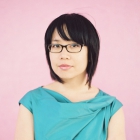I don't know if anyone has done a survey on this kind of thing -- it seems like the only evidence that is out there is ancedotal, but when it comes to names and Asian Americans, I think there's a lot more going on that just people adopting "American" names.
From personal experience, I can think of 7 people I know who have changed their names, going by different names during different periods of their life. Of those 5 are Asian American. Three of those people already have both an Asian and an "American" name (one as a first name, and one as a middle). Of those, two decided to go by their Asian names because their "American" names were blah. One switched from using an Asian name to a European one, not because the Asian one was hard to pronounce or anything like that, but because he just wanted to use his first name and felt he had grown into it. And just two are like the people in this story: people with all Asian names who decided to add an "American" name.
I think there's another story in this story, a complicated, larger story about Asian Americans, how they get their names, and the Asian American identity. About deciding to go by your Asian name. About how many of us have all Asian names, and how many have one of each, or maybe even no Asian name. About the placement of your names -- which is first, which is the middle, and which one do you go by? About why so many Chinese American boys have funny British names: Winston, Wilson, Conrad. And what did our parents hope by giving us those names? How do they feel when we change them? And do we change our names more than other people? Do East Asians change their names more than South Asians? Are we conflicted? Realistic? Reclaiming? Finding our way?







Comments